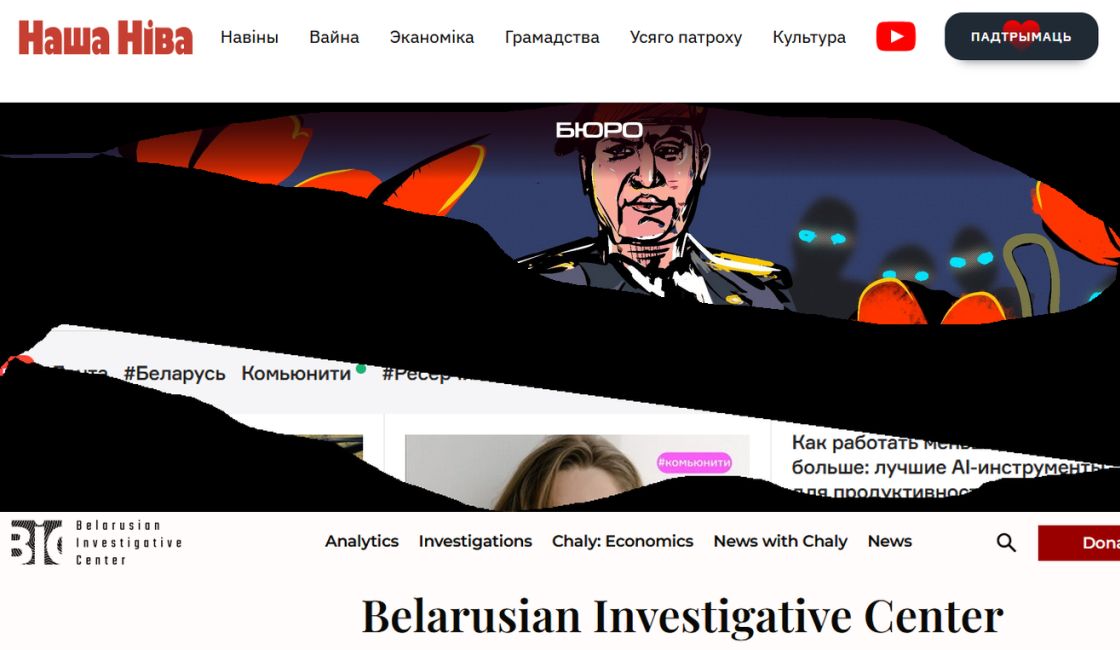The EU should fund and protect the country’s independent media for the sake of its own security.
In an era overwhelmed by overlapping crises, it is understandable that Europe’s attention and resources are being diverted to step up the military-industrial complex. Yet, if there is one asset Europe cannot afford to overlook, it is the Belarusian independent media in exile – because this media community is a critical piece of Europe’s own security architecture.
The key to understanding what is happening lies in the events of five years ago. In 2020, Belarus was rocked by mass protests following a presidential election widely condemned as fraudulent. The regime of Alyaksandr Lukashenka, in power since 1994, responded with brutal force. Independent media were targeted as key players in documenting the unrest: journalists were arrested, newsrooms dismantled, and news outlets declared extremist. The crackdown extended beyond the press to include their families, sources, and audiences. Hopes for political change diminished further in 2022, when the Belarusian government aligned itself with Russia’s invasion of Ukraine, deepening its isolation and authoritarian grip.
Facing mounting repression, many Belarusian journalists fled the country, often forced to relocate multiple times. Despite exile, financial strain, and the emotional toll of separation from their families, they kept their work alive. Over time, they formed a transnational media ecosystem, comprising around 45 media organizations of various kinds: national outlets (Zerkalo, Nasha Niva, and others), local media (Hrodna.Life, Flagshtok, and others), a news agency (Pozirk), investigative journalism outlets (Belarusian Investigative Center, BuroMedia), niche media (Tribuna, Devby.io and many others), a wide network of freelancers, and support organizations (Belarusian Association of Journalists, Press Club Belarus). Today, this exiled media community remains one of the last lifelines of independent information for Belarusians inside the country and abroad.
As a support organization that has been helping Belarusian media grow for 13 years – initially inside Belarus and now in exile – we at Press Club Belarus are repeatedly asked by donors and partners why exiled Belarusian media are not just another struggling diaspora or a scattered group of homeless newsrooms. After the latest seismic shock to hit Belarusian media – the U.S. overseas funding freeze – we realized it was time to offer a more comprehensive answer: why it is of strategic importance for the European Union to support Belarusian media.
In our strategic vision paper Exiled. Effective. Essential, we explain why Belarusian media in exile together form a resilient and effective ecosystem that, despite harsh censorship and severe restrictions, continues to reach audiences inside the country and operates as a critical shield against propaganda emanating from both Minsk and Moscow. Let us take this statement apart step by step.
First, consider their impact. Nearly five years after their forced exile began, Belarusian outlets continue to shape resilient, democratic public opinion inside a country where the truth is under constant attack.
Just imagine: media consumption itself has become dangerous for Belarusians. Reading, watching, sharing, or even subscribing to independent outlets can lead to administrative or criminal prosecution. Yet, in the face of widespread censorship and heavy online blocking, these outlets still manage to reach four in 10 news consumers inside the country.
Next, their strategic value is undeniable. Belarusian journalists in exile have exposed critical threats – from Wagner Group logistics and secret Russian filtration camps in Belarus to the labor exploitation of political prisoners by a German politician and schemes to evade international sanctions. These investigations have informed EU policy, challenged state narratives, and triggered international scrutiny and responses well beyond Belarus. Far from being peripheral players, these journalists function as watchdogs, providing real-time fact-checking and creating information streams that act as alternatives to Kremlin propaganda. In other words, protecting Belarusian independent media directly props up Europe’s informational integrity and resilience.
Finally, Belarusian media in exile, working under the gaze of a cruel regime, embody the very principles that Europe advocates globally, from editorial independence and ethical journalism to resilience against authoritarianism.
As noted by the report’s reviewer Rita Rudusa, a media expert and founder of the Baltic Center for Media Excellence, these truths illustrate the immense power of independent journalism – making it perfectly logical to view Belarusian exile media as a strategic partner in European security.
Our report also reveals, however, that the ecosystem’s success hinges precariously on its long-term sustainability. The recent abrupt cuts in U.S. funding demonstrate how fragile the sector remains. Business models are non-existent when home audiences can give financial support to independent media only at risk of prosecution. Visas for journalists living in exile are often a challenge to obtain, and legal protections in host countries vary dramatically. Without predictable, multi-year support, this truly efficient ecosystem faces the risk of gradual attrition precisely when Europe needs it most.
We propose a shift in how Europe perceives and interacts with Belarusian independent media: not merely as recipients of aid but as strategic partners vital to European security and democratic stability. Concretely, this means integrating Belarusian exile media into initiatives such as the European Democracy Shield and providing sustained, structural funding mechanisms. It also means offering robust legal protections and stable residency rights within EU member states.
Thus, this is not just about preserving press freedom in Belarus, it is about bolstering Europe’s eastern flank against an escalating hybrid threat. The Belarusian independent media ecosystem is a front-line shield for Europe’s democratic architecture, offering proven value and resilience. Allowing it to deteriorate would not only betray democratic allies but would also weaken Europe itself.
The choice facing European institutions today is clear: invest in the Belarusian exiled media, or risk losing a strategic asset at a moment when Europe strives for strategic allies and seeks to restore its global leadership.
Natalia Belikova is in charge of international cooperation at Press Club Belarus.
